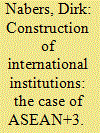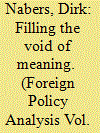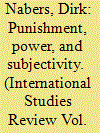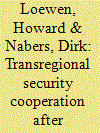|
|
|
Sort Order |
|
|
|
Items / Page
|
|
|
|
|
|
|
| Srl | Item |
| 1 |
ID:
055615


|
|
|
| 2 |
ID:
073576


|
|
|
|
|
| Publication |
2006.
|
| Summary/Abstract |
In order to put a lens on the issue of international security cooperation after 11 September 2001, this article examines the question of how collective action in International Relations becomes possible. The author maintains that a fair amount of inter-state collective action can be understood, even explained, by analysing the culture of the international system. Using discourse analysis as a tool, the analysis addresses the underlying ideas, norms and identities that constitute the relationship between the United States and Japan, on the one hand, and Germany and the United States, on the other, as it has evolved since September 2001. The method exposes how some ideas are privileged over others, how norms are maintained, reformulated and abandoned, how identity is constructed and how power is legitimized in the 'war on terror'.
|
|
|
|
|
|
|
|
|
|
|
|
|
|
|
|
| 3 |
ID:
087711


|
|
|
|
|
| Publication |
2009.
|
| Summary/Abstract |
The paper aims to shed light on the conceptual link between international crises such as the one following September 11, 2001, and processes of identity construction through foreign policy. Crisis and identity construction are conceptualized as constant political phenomena. The political process is constituted by meaningful acts of social agents, and can thus only be grasped by analyzing meaning. Meaning is transmitted by language. Meaningful language is never reducible to individual speakers; it is a social act. The sum of articulatory practices in a social field is called discourse. Linking Critical Discourse Analysis (CDA) with the theory of hegemony developed by Ernesto Laclau and Chantal Mouffe, I will be able to show how hegemonic discourses serve as the nexus between the discursive construction of crises and identity change. A number of problems will be acknowledged when linking these two strands of thinking, as CDA and Laclauian theory work with tentatively different conceptions of discourse. The construction of the "war on terror" by the Bush administration between September 2001 and May 2003 is used as a case to illustrate the theoretical argument.
|
|
|
|
|
|
|
|
|
|
|
|
|
|
|
|
| 4 |
ID:
087731


|
|
|
|
|
| Publication |
2009.
|
| Summary/Abstract |
The paper aims to shed light on the conceptual link between international crises such as the one following September 11, 2001, and processes of identity construction through foreign policy. Crisis and identity construction are conceptualized as constant political phenomena. The political process is constituted by meaningful acts of social agents, and can thus only be grasped by analyzing meaning. Meaning is transmitted by language. Meaningful language is never reducible to individual speakers; it is a social act. The sum of articulatory practices in a social field is called discourse. Linking Critical Discourse Analysis (CDA) with the theory of hegemony developed by Ernesto Laclau and Chantal Mouffe, I will be able to show how hegemonic discourses serve as the nexus between the discursive construction of crises and identity change. A number of problems will be acknowledged when linking these two strands of thinking, as CDA and Laclauian theory work with tentatively different conceptions of discourse. The construction of the "war on terror" by the Bush administration between September 2001 and May 2003 is used as a case to illustrate the theoretical argument.
|
|
|
|
|
|
|
|
|
|
|
|
|
|
|
|
| 5 |
ID:
123139


|
|
|
|
|
| Publication |
2013.
|
| Summary/Abstract |
North Korea puzzles many observers. Mostly, it is referred to as the most isolated country in the world, being a timeless mystery, enigma, or terra incognita. While these characterizations reveal the presupposition of a genuine void of knowledge concerning the assessment of North Korean state affairs (however, without preventing scholarship from producing, compiling and depending on information regarding North Korea), they also point to the significance in filling this knowledge gap. The article argues that images play an important role in this operation and provides a discussion of selected photographic essays and single images depicting North Korea. Images work; they do something by evoking a particular perspective of what is shown in them allowing only specific kinds of seeing. Relating the viewer and the viewed in ways that determine what or who is (in)visible, images create boundaries and difference which, in turn, affects who "we" and "they" are.
|
|
|
|
|
|
|
|
|
|
|
|
|
|
|
|
| 6 |
ID:
100470


|
|
|
|
|
| Publication |
2010.
|
| Summary/Abstract |
The article inquires into the conditions of effective leadership of states in international politics, and develops a framework for the study of so-called (new) regional powers such as Brazil, China, India, and South Africa in processes of regional institution-building. Various theoretical strands will be discussed as to the requirements of effective leadership in international affairs. Most importantly, the relationship between power, leadership and hegemony will be outlined. It is argued that the connection between leadership and hegemony is one of co-constitution. Leadership is necessarily based on hegemony, while hegemony can only be sustained through leadership. Furthermore, it will be shown that both leadership and hegemony are essentially political in character, whereas power has no such insinuation but has to be translated into leadership and hegemony through discursive means. Finally, the analysis asks for the preconditions of leadership in East Asia, using China's and Japan's roles in East Asian regionalism as an illustration.
|
|
|
|
|
|
|
|
|
|
|
|
|
|
|
|
| 7 |
ID:
095634


|
|
|
| 8 |
ID:
082675


|
|
|
|
|
| Publication |
2008.
|
| Summary/Abstract |
This article explores the tension between the role of religious language as a domestic legitimising device for the Bush administration and its adverse impact on Washington's foreign policy image. It argues that President Bush's political fundamentalism after 9/11 has become a major obstacle to effectively addressing the challenge of international terrorism. It examines the interface between religion and the traditional idea of US exceptionalism, considers the political rise of the Christian right in American politics since the 1970s, shows how 9/11 served as a transformative event in the emergence of political fundamentalism in the White House and explores the impact of the construction of President Bush's 'war on terror' policies on the domestic and international environments. The conclusion acknowledges a substantial gulf between the domestic and international responses to President Bush's brand of political fundamentalism, but concedes that these differences have been narrowing over time.
|
|
|
|
|
|
|
|
|
|
|
|
|
|
|
|
| 9 |
ID:
066968


|
|
|
|
|
|
|
|